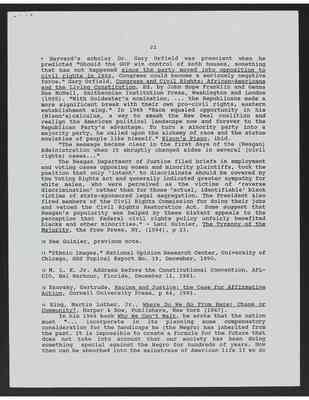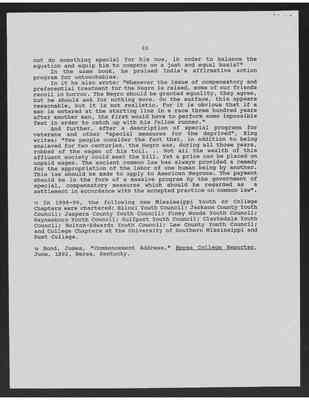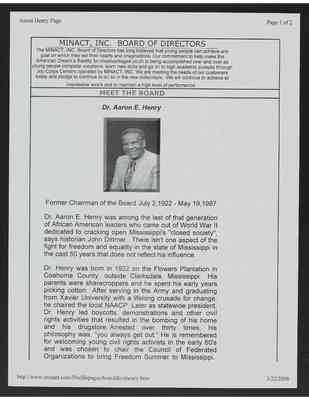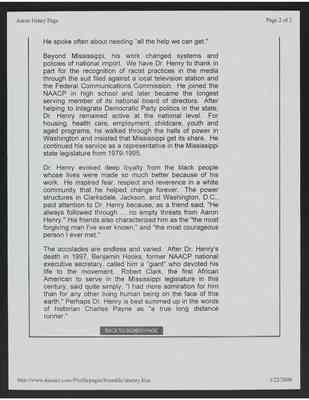Pages
21
21
9 Harvard's scholar Dr. Gary Orfield was prescient when he predicted "Should the GOP win control of both houses, something that has not happened since the party moved into opposition to civil rights in 1964, Congress could become a seriously negative force." Gary Orfield, Congress and Civil Rights: African-Americans and the Living Constitution, Ed. by John Hope Franklin and Genna Rae McNeil, Smithsonian Institution Press, Washington and London (1995). "With Goldwater's nomination, . . . the Republicans made a more significant break with their own pro-civil rights, eastern establishment wing." In 1968 "Race equaled opportunity in his (Nixon's) calculus, a way to smash the New Deal coalition and realign the American political landscape now and forever to the Republican Party's advantage. To turn a minority party into a majority party, he called upon the alchemy of race and the status anxieties of people like himself." Nixon's Piano, ibid.
"The message became clear in the first days of the (Reagan) Administration when it abruptly changed sides in several (civil rights) cases..."
The Reagan Department of Justice filed briefs in employment and voting cases opposing women and minority plaintiffs, took the position that only 'intent' to discriminate should be covered by the Voting Rights Act and generally indicated greater sympathy for white males, who were perceived as the victims of 'reverse discrimination' rather than for those 'actual, identifiable' black victims of state-sponsored legal segregation. The President also fired members of the Civil Rights Commission for doing their jobs and vetoed the Civil Rights Restoration Act. Some suggest that Reagan's popularity was helped by these blatant appeals to the perception that federal civil rights policy unfairly benefited blacks and other minorities." - Lani Guinier, The Tyranny of the Majority, the Free Press, NY, (1994). p 23.
10 See Guinier, previous note.
11 "Ethnic Images," National Opinion Research Center, University of Chicago, GSS Topical Report No. 19, December, 1990.
12 M. L. K. Jr. Address before the Constitutional Convention, AFL-CIO, Bal Harbour, Florida, December 11, 1961.
13 Ezorsky, Gertrude, Racism and Justice: the Case for Affirmative Action, Cornell University Press, p 64, 1991.
14 King, Martin Luther, Jr., Where Do We Go From Here: Chaos or Community?, Harper & Row, Publishers, New York (1967).
In his 1964 book Why We Can't Wait, he wrote that the nation must "...incorporate in its planning some compensatory consideration for the handicaps he (the Negro) has inherited from the past. It is impossible to create a formula for the future that does not take into account that our society has been doing something special against the Negro for hundreds of years. How then can be absorbed into the mainstream of American life if we do
22
22
not do something special for him now, in order to balance the equation and equip him to compete on a just and equal basis?"
In the same book, he praised India's affirmative action program for untouchables.
In it he also wrote: "Whenever the issue of compensatory and preferential treatment for the Negro is raised, some of our friends recoil in horror. The Negro should be granted equality, they agree, but he should ask for nothing more. On the surface, this appears reasonable, but it is not realistic. For it is obvious that if a man is entered at the starting line in a race three hundred years after another man, the first would have to perform some impossible feet in order to catch up with his fellow runner."
And further, after a description of special programs for veterans and other "special measures for the deprived", King writes: "Few people consider the fact that, in addition to being enslaved for two centuries, the Negro was, during all those years, robbed of the wages of his toil . .. Not all the wealth of this affluent society could meet the bill. Yet a price can be placed on unpaid wages. The ancient common law has always provided a remedy for the appropriation of the labor of one human being by another. This law should be made to apply to the American Negroes. The payment should be in the form of a massive program by the government of special, compensatory measures which should be regarded as a settlement in accordance with the accepted practice on common law."
15 In 1998-99, the following new Mississippi Youth or College Chapters were chartered: Biloxi Youth Council; Jackson County Youth Council; Jaspers County Youth Council; Piney Woods Youth Council; Waynesboro Youth Council; Gulfport Youth Council; Clarksdale Youth Council; Bolton-Edwards Youth Council; Lee County Youth Council; and College Chapters at the University of Southern Mississippi and Rust College.
16 Bond, James, "Commencement Address," Berea College Reporter, June, 1892, Berea, Kentucky.
23
Aaron Henry Page Page 1 of 2
MINACT, INC. BOARD OF DIRECTORS
The MINACT, INC. Board of Directors has long believed that young people can achieve any goal on which they set their hearts and imaginations. Our commitment to help make the American Dream a Reality for disadvantaged youth is being accomplished over and over as young people complete vocations, learn new skills and go on to high academic pursuits through Job Corps Centers operated by MINACT, INC. We are meeting the needs of our customers today and pledge to continue to do so in the new millennium. We will continue to achieve at impressive levels and to maintain a high level of performance.
MEET THE BOARD Dr. Aaron E. Henry [photograph of Mr. Henry] Former Chairman of the Board July 2, 1922 - May 19, 1997
Dr. Aaron E. Henry was among the last of that generation of African American leaders who came out of World War ll dedicated to cracking open Mississippi's "closed society", says historian John Dittmer. There isn't one aspect of the fight for freedom and equality in the state of Mississippi in the past 50 years that does not reflect his influence.
Dr. Henry was born in 1922 on Flowers Plantation in Coahoma County, outside Clarksdale, Mississippi. His parents were sharecroppers and he spent his early years picking cotton. After serving in the Army and graduating from Xavier University with a lifelong crusade for change, he chaired the local NAACP. Later as statewide president, Dr. Henry led boycotts, demonstrations and other civil rights activities that resulted in the bombing of his home and his drugstore. Arrested over thirty times, his philosophy was, "you always get out." He is remembered for welcoming young civil rights activists in the early 60's and was chosen to chair the Council of Federated Organizations to bring Freedom Summer to Mississippi.
http://www.minact.com/Profilepages/boarddir/ahenry.htm
24
Aaron Henry Page Page 2 of 2
He spoke often about needing "all the help we can get."
Beyond Mississippi, his work changed systems and policies of national import. We have Dr. Henry to thank in part for the recognition of racist practices in the media through the suit filed against a local television station and the Federal Communications Commission. He joined the NAACP in high school and later became the longest serving member of its national board of directors. After helping to integrate Democratic Party politics in the State, Dr. Henry remained active at the national level. For housing, health care, employment, childcare, youth and aged programs, he walked through the halls of power in Washington and insisted that Mississippi get its share. He continued his service as a representative in the Mississippi state legislature from 1979-1995.
Dr. Henry evoked deep loyalty from the black people whose lives were made so much better because of his work. He inspired fear, respect and reverence in a white community that he helped change forever. The power structures in Clarksdale, Jackson, and Washington, D.C., paid attention to Dr. Henry because, as a friend said, "He always followed through ... no empty threats from Aaron Henry." His friends also characterized him as "the most forgiving man I've ever known," and "the most courageous person I ever met."
The accolades are endless and varied. After Dr. Henry's death in 1997, Benjamin Hooks, former NAACP national executive secretary, called him a "giant" who devoted his life to the movement. Robert Clark, the first African American to serve in the Mississippi legislature in this century, said quite simply, "I had more admiration for him than for any other living human being on the face of this earth." Perhaps Dr. Henry is best summed up in the words of historian Charles Payne as "a true long distance runner."
BACK TO BOARD PAGE



